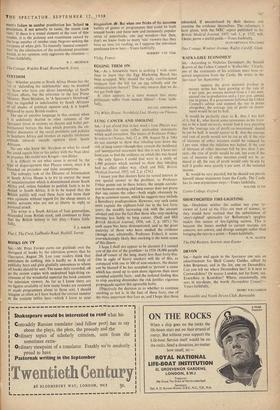Sia,—Whether anyone at South Africa House has the job of
'defending the indefensible' may be doubted by those who have any direct knowledge of South African affairs, but the reference to the late Prime Minister, Hans Strydom, in 'A Spectator's Notebook' May be regarded as indefensible by South Africans of all shades of political opinion and, it is hoped, deplored by many British readers. The use of emotive language in this context when it is sedulously decried in other columns of the Spectator (even in reviews on theatre and ballet per- formances) betrays the bias which prevents the ob- jective discussion of the racial problems and policies in Southern Africa and invokes an equally intolerant attitude tdwards outside opinion from South Africans.
No one who knew Mr. Strydom or what he stood for could equate him or his policy with the Nazi ideal or practice. His model was Kruger—not Hitler.
It is difficult to see what cause is served by the I type of disparagement that Pharos voices, since it is founded on prejudice and false assumptions.
The unhappy task of the Director of Information at South Africa House is to try to correct the mass of misinformation which is disseminated about South Africa and, unless freedom to publish facts is to be denied to South Africa, it is to be hoped that the British public will read these facts and form their own opinions without regard for the cheap sneers at public servants who are not at liberty to reply to• Personal attack. • The writer is a South African of four generations, descended from British stock, and continues to hope that the British believe in fair play.—Yours faith- fully,
F. E. BAKER


































 Previous page
Previous page